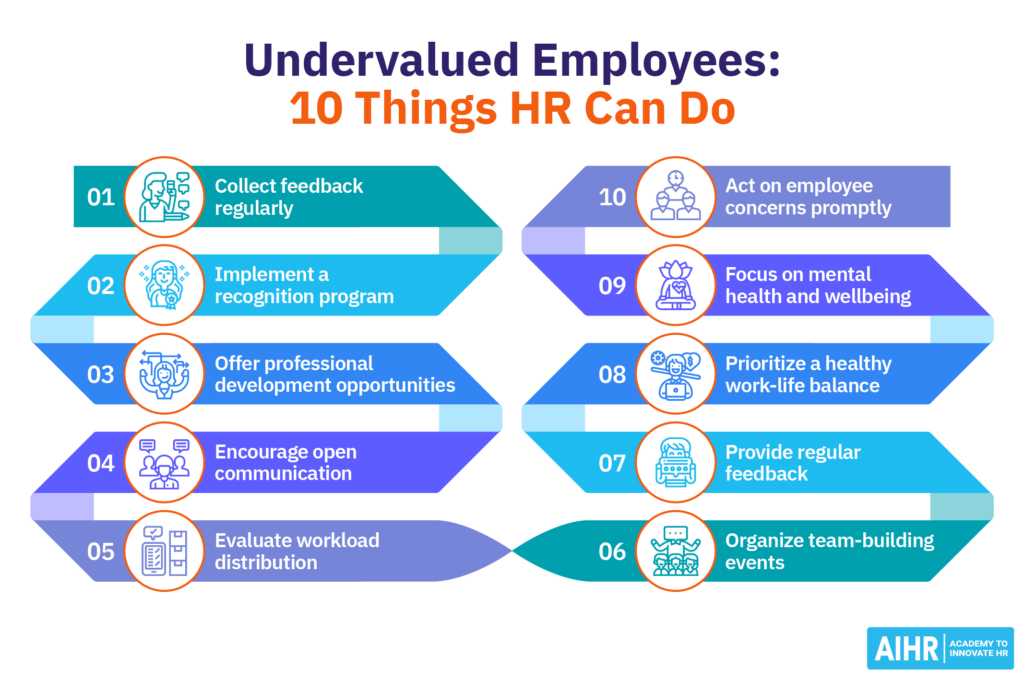10 Things To Do When Employees Feel Undervalued

In today’s dynamic work environment, businesses must ensure their employees feel valued and appreciated. Unfortunately, underappreciation and disengagement are prevalent across all industries, causing a negative domino effect on employee morale, productivity, and satisfaction.
Fortunately, as human resources (HR) professionals play a crucial role in shaping a company’s culture and managing its workforce, they possess the unique power to reverse these trends.
This article will discuss valuable strategies HR can implement to show their appreciation for staff members while reaping the benefits of a thriving, engaged workplace.
Contents
Disengaged employees in the workforce
How can you tell if your employees feel undervalued?
10 things HR can do to increase employee engagement
Disengaged employees in the workforce
It can be hard to accept that our employees don’t enjoy being where they are, but it’s an unfortunate reality. According to a Blue Board study, 67% of Americans feel appreciation at work is in short supply. A Gallup study proved that employees rarely receive praise for good work.
That same study also revealed that disengaged employees cost organizations up to $350 billion per year in lost productivity. And when these employees decide to leave, 79% state that they quit their jobs due to a lack of appreciation. There’s no denying that change is necessary.
As these numbers suggest, it is crucial for organizations, and HR departments specifically, to take active steps toward addressing issues related to employee recognition and job satisfaction.
How can you tell if your employees feel undervalued?
Based on the statistics, it’s very likely that your employees feel undervalued and underappreciated. With that said, most employees won’t verbalize when they think this way, making it harder for you to implement a strategy to prevent further mental health decline in your staff and teams.
Recognizing the signs of undervalued employees is vital to addressing the issue proactively and taking timely action. Here are five indicators that your employees may feel undervalued.
- Changes in performance or behaviors: When employees feel underappreciated, their level of motivation can decrease, leading to a decline in their performance or work habits. Pay attention to any sudden drop-offs in productivity or increased tardiness.
- No one communicates in meetings: If employees don’t engage during meetings, offer ideas, or voice concerns, it can be a sign that they don’t feel their opinions matter. A lack of appreciation may lead to this reluctance to contribute and share insights.
- Collaboration/Innovation has stalled: When people feel unappreciated, they might stop putting forth the extra effort required for collaboration and innovation within teams. This disengagement can negatively impact overall company creativity and growth.
- Employees are quitting: A high turnover rate is often a red flag for low employee satisfaction levels. Examining exit interviews and employee satisfaction data can provide further insight into whether this factor influences departures.
- Management style needs to be improved: An ineffective management style that doesn’t foster trust or encourage open communication can contribute to feeling undervalued among team members. Assess management effectiveness by observing interactions between leaders and subordinates or soliciting employee feedback directly.
A toxic work environment, in general, won’t support a culture where employees feel valued. You’ll have to pay close attention to your workplace if you want to see a change in behaviors.
10 things HR can do to increase employee engagement
Now that you know the signs of an undervalued employee and the importance of feedback, HR departments can start implementing strategies that work to improve employee satisfaction rates.
1. Collect feedback regularly
Collecting feedback from your employees is critical to making them feel valued and appreciated. Regularly gathering their opinions and insights enables you to gauge their satisfaction levels, identify improvement areas, and implement measures to address concerns.
To make sure you collect feedback regularly, implement convenient input methods. Online surveys, suggestion boxes, and one-on-one meetings are some examples. Be sure to maintain an open and receptive atmosphere so employees feel comfortable sharing their thoughts.
2. Implement a recognition program
Developing and implementing an employee recognition program is an effective way to combat feelings of underappreciation among your workforce. That’s why you should establish a system to acknowledge and reward your employees’ hard work, performance, or project contributions.
An effective recognition program will clearly outline how and when your employees will receive rewards. Your program should include personalized rewards that suit each individual’s personality. Timely rewards are also integral if you want to encourage good behavior.
3. Offer professional development opportunities
One of the most effective approaches to making employees feel valued is offering them ample professional development opportunities. When you invest in their growth and support their career aspirations, your staff members feel you care about them and their success.
A great professional development program will find gaps in the employee’s skill set and work to improve on them. HR can either sign them up for formal training opportunities via training courses, seminars, or workshops or encourage employees to attend conferences.
4. Encourage open communication
Promoting a culture of open communication is necessary if you want your employees to feel heard, respected, and valued. Team members are more likely to air their thoughts regarding workplace concerns or improvement opportunities when they believe they have a voice.
If your staff feels like they can’t speak up, you’ll need to commit to the slow process of building trust. That means establishing open lines of communication between management and staff, creating opportunities for regular dialogue, and facilitating multiple communication channels.
5. Evaluate workload distribution
An essential aspect of ensuring that employees feel appreciated is taking the time to evaluate workload distribution. Unevenly distributed work can lead to undue stress and feelings of being taken for granted, especially among those who consistently carry a heavier burden.
To begin addressing this issue, carefully assess how tasks are assigned. If a team member disproportionately handles all the responsibilities, balance their workload. Create an equitable workload distribution plan and continuously monitor it in case they fall back into bad habits.
6. Organize team-building events
Team-building events are powerful tools to foster a sense of appreciation among employees while promoting strong professional relationships. These activities boost morale and facilitate improved communication, cooperation, and understanding within the group.
Start by creating ideas for social outings or team-based events catering to diverse interests. These could range from charity activities to virtual team challenges. Ask for your employees’ input during the planning process to get the most out of these team-building events.
7. Provide regular feedback
While receiving feedback is essential, so is giving it. Through open discussions about performance and growth, you can offer guidance tailored to individual needs while helping employees understand how they contribute to the organization’s success as you continue to scale.
Establish a structured review process that includes formal evaluations and informal check-ins throughout the year, and don’t limit the conversations to criticisms and shortcomings. Instead, engage in a meaningful dialogue that helps employees visualize their future within the company.
8. Prioritize a healthy work-life balance
Acknowledge that employees have lives outside of the office. By recognizing the importance of personal time, you demonstrate empathy towards their individual needs outside the office while helping reduce burnout and stress.
To promote a healthy work-life balance, encourage flexible working arrangements, such as remote work options or adjustable schedules. Then, implement policies where employees can disconnect while off duty. Above all else, emphasize the importance of self-care and health.
9. Focus on mental health and wellbeing
To cultivate feelings of appreciation among your employees, you’ll need to prioritize their mental health and wellbeing. When you work to address this aspect of their lives proactively, you send a message that the organization cares about its workforce, not just its bottom line.
Many of the topics discussed on this list will promote positive mental health, but you can go the extra mile by offering Employee Assistance Programs (EAPs). Also, make sure that management leads by example. By doing so, employees won’t feel shame taking a sick day.
10. Act on employee concerns promptly
Timely response to employee concerns is critical in demonstrating that you value and appreciate their input. Addressing issues as they arise helps resolve existing problems and establishes trust within the workforce by proving that management takes them seriously.
Open communication channels go a long way in identifying issues as they occur. But once they’re identified, management has to take immediate action to address it. After you do the work to solve the problem, conduct a follow-up to ensure the implemented solutions have worked.
In conclusion
Fostering an environment where employees feel genuinely appreciated is essential for maintaining a healthy, thriving organization. These strategies can help guide HR professionals toward building a culture that rewards hard work while promoting overall satisfaction.
By implementing these practices within your workplace, you can improve employee engagement, boost company performance, and create an atmosphere of trust and care.
It’s time to take action now. Invest in your employees by prioritizing their needs, addressing concerns swiftly, and unlocking the full potential of each individual within your organization. Show them how much they matter and see your company flourish as a result.
Weekly update
Stay up-to-date with the latest news, trends, and resources in HR
Learn more
Related articles
Are you ready for the future of HR?
Learn modern and relevant HR skills, online












